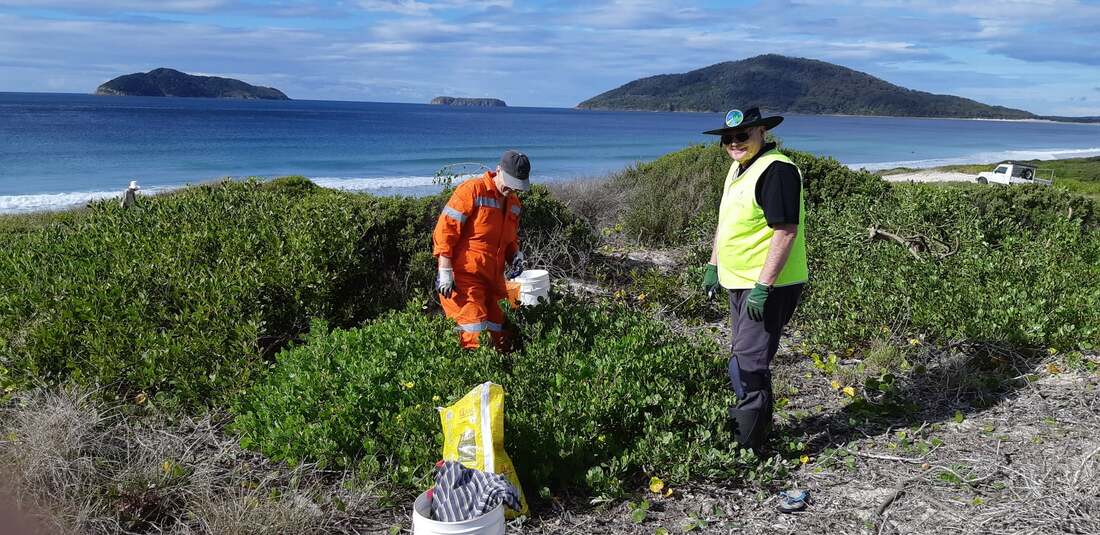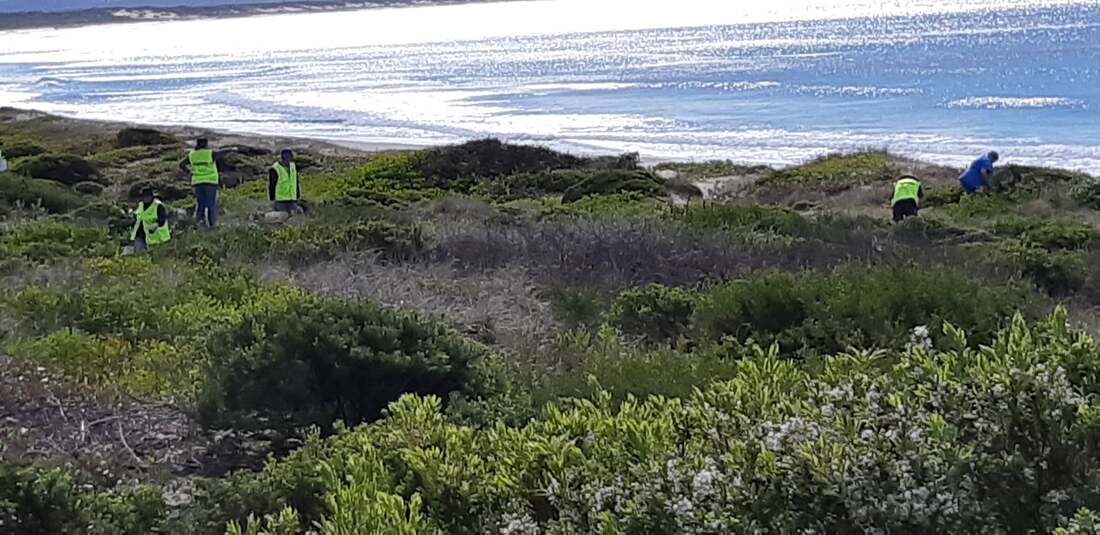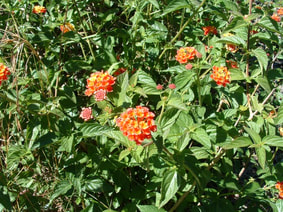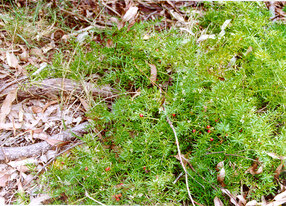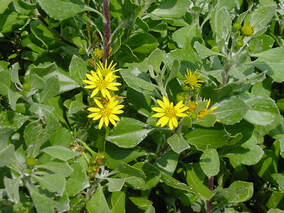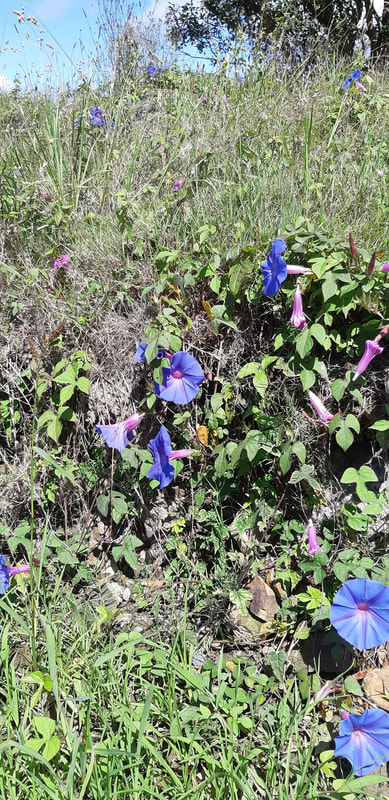Bitou Busters Hawks Nest and Tea Gardens
Community Bushcare Weeding Group
Meets 9:15am usually 4th Saturday each month
From March to October
Meeting places for weeding vary. Please contact Trish Blair
0416884238 or [email protected]
The next BITOU BUSTERS dates for 2024: More dates will be up later.
- 23 March 27 July
- 27 April 24 August
- 25 May 28 September
- 22 June 26 October
|
Bitou bush is an introduced species which invades native coastal heathlands, grasslands, woodlands and forests. It grows quickly and forms dense stands, replacing native plants and destroying the habitat of native animals. Infestations can smother sand dunes, headland and coastal vegetation, affecting many threatened species and plant communities.
Bitou Busters are an enthusiastic group of local volunteers who are dedicated to the elimination and control of all invasive weeds; mainly Bitou, Asparagus Fern and Lantana that destroy our native bushlands. We remove the weeds from sand dunes, recreation areas, picnic areas, walking tracks/pathways, National Parks, rivers, lakes and other waterways.
We learn how to identify, remove and destroy weeds to stop their spread, achieving a restored and repaired bushland. As the Hawks Nest and Tea Gardens area is surrounded on three sides by ocean and river, eradication is possible and often achieved. Tea Gardens Hawks Nest Bitou Busters are supported by MidCoast Council, who organise inductions and supplies all tools including gloves and buckets to enable us to do our job. From March to October on every fourth Saturday of the month, we meet and bitou bust for 1½ hours, then end up at a café for a coffee and a lively debriefing of the morning’s work. We also welcome all interested Landcare and Bitou Buster volunteers from other areas in NSW to come and join us while visiting Hawks Nest and Tea Gardens.
|
|
Rubbish Blights Dune Care
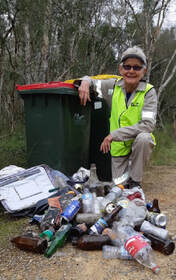 Bitou Buster, Adrienne Ingram, with a mere sample of the rubbish collected from the dunes.
Bitou Buster, Adrienne Ingram, with a mere sample of the rubbish collected from the dunes.
Volunteers clearing invasive weeds on dunes at Hawks Nest found so much rubbish they ran out of bags to take it away! Recalling it was almost five years to the day when their work was featured in The Nota, showing a similar quantity of bottles, cans, wrappers and drug paraphernalia, Bitou Buster co-ordinator, Jill Madden, said they were disappointed to see so little had changed. “We are not here to collect rubbish, we are volunteers saving the dunes,” she said. “We just wish people would take their rubbish home with them.”
Fourteen Bitou Busters worked at the back of the dunes between Sanderling Avenue and the Surf Club on Booner Street, part of the Michael Rowe Memorial Walk, which features collections of wildflowers stretching all the way along the coast to Myall Lakes National Park.
Council workers had recently widened the walk and the volunteers followed them to clear the Bitou Bush, exposing some spectacular native regeneration, especially the brilliant yellow golden Guinea Glowers (Hibbertia Scandens) intertwined among the Pigface, Coastal Tea Tree, Banksia and Wattle.
Fourteen Bitou Busters worked at the back of the dunes between Sanderling Avenue and the Surf Club on Booner Street, part of the Michael Rowe Memorial Walk, which features collections of wildflowers stretching all the way along the coast to Myall Lakes National Park.
Council workers had recently widened the walk and the volunteers followed them to clear the Bitou Bush, exposing some spectacular native regeneration, especially the brilliant yellow golden Guinea Glowers (Hibbertia Scandens) intertwined among the Pigface, Coastal Tea Tree, Banksia and Wattle.
Volunteers Confronted by Thick Weed
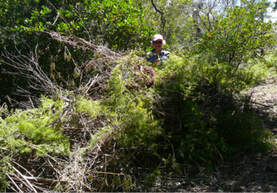 A Bitou Buster dwarfed by the Asparagus Weed.
A Bitou Buster dwarfed by the Asparagus Weed.
Thick blanket of Asparagus Weed and waist high Bitou Bush met Hawks Nest and Tea Gardens Bitou Busters on their first working bee of the season on Saturday, 25 March 2017. Thirteen volunteers worked on their hands and knees
along a strip of distressed native vegetation between the Hawks Nest Oval and the caravan park fence.
The Asparagus Weed – which is different from edible asparagus – needed careful handling due to the abundance of red and green berries on the fern, for just a single berry left on the ground would result in a new infestation; so the berries and fern had to be removed and bagged before removal of the Asparagus heart could start. The area also has a number of swamp mahogany trees, an important food source for koalas.
Asparagus Weed is one of the most physically difficult weeds to remove, so the volunteers enjoyed a refreshing drink at Benchmark on Booner, the group's proud sponsor.
The NSW Environment Trust Grant supports the Hawks Nest and Tea Gardens Bitou Busters in their work to regenerate the native bush and raise awareness of the environment in the community.
along a strip of distressed native vegetation between the Hawks Nest Oval and the caravan park fence.
The Asparagus Weed – which is different from edible asparagus – needed careful handling due to the abundance of red and green berries on the fern, for just a single berry left on the ground would result in a new infestation; so the berries and fern had to be removed and bagged before removal of the Asparagus heart could start. The area also has a number of swamp mahogany trees, an important food source for koalas.
Asparagus Weed is one of the most physically difficult weeds to remove, so the volunteers enjoyed a refreshing drink at Benchmark on Booner, the group's proud sponsor.
The NSW Environment Trust Grant supports the Hawks Nest and Tea Gardens Bitou Busters in their work to regenerate the native bush and raise awareness of the environment in the community.
Hard working Bitou Busters working on their hands and knees
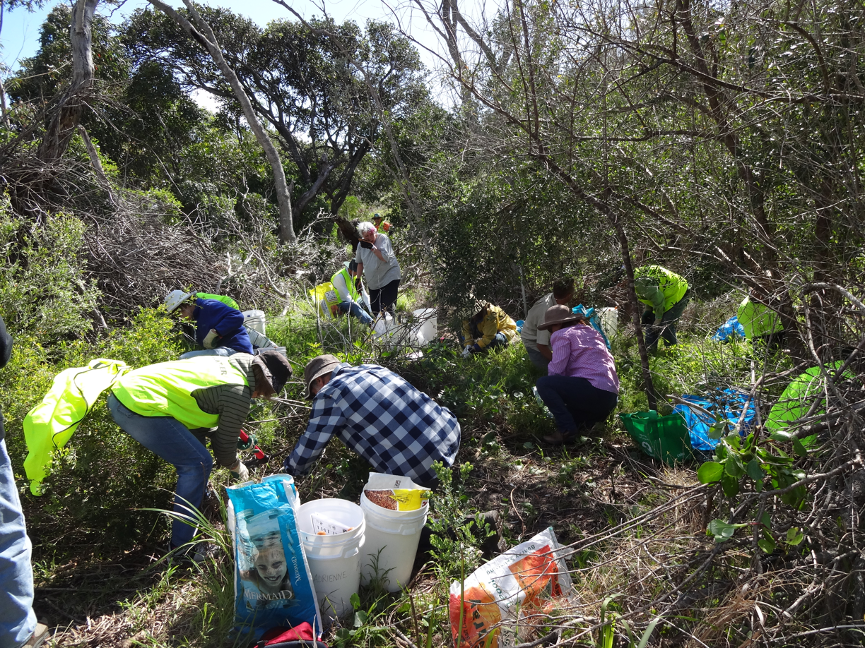
Morning glory is becoming a serious threat to the bush in Hawks Nest.
It was brought over for their attractive flower from Mexico and Central America.
Their alternative common name is mile-a-minute, giving an idea of the speed at which, they can grow, totally engulfing the bush in a very short time.
It was brought over for their attractive flower from Mexico and Central America.
Their alternative common name is mile-a-minute, giving an idea of the speed at which, they can grow, totally engulfing the bush in a very short time.
|
Sixteen Bitou Busters removed many bags of the weed morning glory along The Boulevarde in July 2019. Huge bitou bushes and large areas of mother-of-millions were also removed. It was difficult work on hands and knees tracing crisscrossing vines over large stretches of bush to make removal possible. Adrienne Ingram Bitou Buster |
